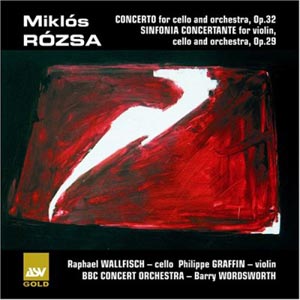Cello Concerto, O. 32 / Sinfonia Concertante, Op.29
Music composed by Miklos Rozsa
Performed by Raphael Wallfisch (vc); Philippe Graffin (vn); BBC Concert Orchestra
Conducted by Barry Wordsworth
Available on ASV Gold (GLD4018)
Running Time: 62:24
Crotchet Amazon US

It’s inevitable and apparently obligatory when considering Miklos Rozsa’s concert music to comment on the composer’s own ‘double life’ description of his career, that is his explicit and oft-made distinction between his work-for-hire in Hollywood and his ‘serious’ pieces for the concert hall. But those soundtrack fans who might approach his concert works with some trepidation as a result will find that the distinction is more apparent than real – it’s the wary caveat of a composer who was concerned that his Hollywood reputation would prejudice the ‘classical’ music world against him. Fortunately with each passing year that prejudice is fast dissipating as more new recordings of Rozsa’s delightful concertos and orchestral works appear.
In fact it’s worth noting in passing that the difference between Rozsa’s film and concert works is simply one of degree, not of kind. Film music, by its very nature, needs to be direct, instantly accessible; a concert-hall piece, by contrast, can take its time, develop more slowly and reveal its secrets at its own pace, not one determined by dramatic exigencies. So to call these Rozsa concert works ‘serious’, as opposed to a classic film score such as Ben-Hur for example, is not to suggest that his film music is somehow less worthy – despite the implication of Rozsa’s ‘double life’ phrase – only that the pragmatic function of a film score dictated a somewhat different approach for the composer.
Commissioned by cellist Janos Starker in 1967, the Cello Concerto, Op. 32 is a splendidly moody piece inflamed with all the gypsy passion of the composer’s unmistakable Eastern-European idiom – that style so familiar from innumerable film scores. The first movement contrasts dark-hued lyrical passages for the orchestra with virtuosic, even ebullient writing for the soloist. In the second movement, the cello’s melodic argument becomes increasingly impassioned set against a misterioso accompaniment. The finale, an insistent and uncompromising rondo, ratchets that sense of tension still tighter. As the booklet notes for this ASV release quite properly remark, this important work ‘is a wonderful showpiece for the instrument and deserves far wider currency’.
The same could be said for the Sinfonia Concertante, Op. 29 – to my mind arguably an even finer work than the solo concerto. The creation of this powerful and stirring piece (actually a double concerto for violin and cello) is related with rueful humour by Rozsa in his autobiography: legendary violinist Jascha Heifetz – for whom Rozsa had written his best-known Violin Concerto – and cellist pal Gregor Piatigorsky wanted a concerto they could perform together. Rozsa naturally took up the commission with enthusiasm, only to find at the rehearsals that the two soloists bickered like rival prima donnas about the amount of allotted time the other had in the limelight. Rozsa reworked the piece extensively to placate them both, ensuring that if one had a brilliant passage then it was immediately followed by a passage of equal virtuosity for the other. Years later Rozsa returned to the score and was able to undo the structural damage caused by the demands of the original soloists, and it is this revised version that is presented here.
We are now in the enviable position of having several rival accounts of both of these works to choose from on CD, but anyone tempted by this new disc will certainly not regret their choice. Cellist Raphael Wallfisch is certainly up to the task, being a pupil of original dedicatee Piatigorsky. There’s a real sense of urgency, of dramatic bite to his playing throughout, a sense heightened by conductor Barry Wordsworth’s brisk pace-setting: his Sinfonia Concertante is over three minutes faster than that of James Sedares on Koch. Another point in the new disc’s favour is the bright, realistic recording of both soloists and BBC Concert Orchestra, far clearer than the unfortunately rather muddy acoustic of those pioneering Sedares / New Zealand discs made back in the mid-1990s. So Rozsa aficionados (whether you already know his concert music or not) need not hesitate to acquire this compelling disc.
Selected other recordings:
Cello Concerto
- Lynn Harrell; Atlanta Symphony Orchestra / Yoel Levi. TelarcCD80518
- Brinton Smith; New Zealand Symphony Orchestra / James Sedares. Koch International Classics 37402-2
- Peter Rejto; Pecs Hungarian Symphony Orchestra / Howard Williams. Silva ScreenSILKD6011
Sinfonia Concertante
- Andras Agoston; Laszlo Fenjo; Philharmonia Hungarica / Werner Andreas Albert. CPO 999 839-2
- Igor Gruppman; Richard Boch; New Zealand Symphony Orchestra / James Sedares. Koch International Classics 37304-2
Mark Walker
Rating:
3.5
Return to Reviews Index